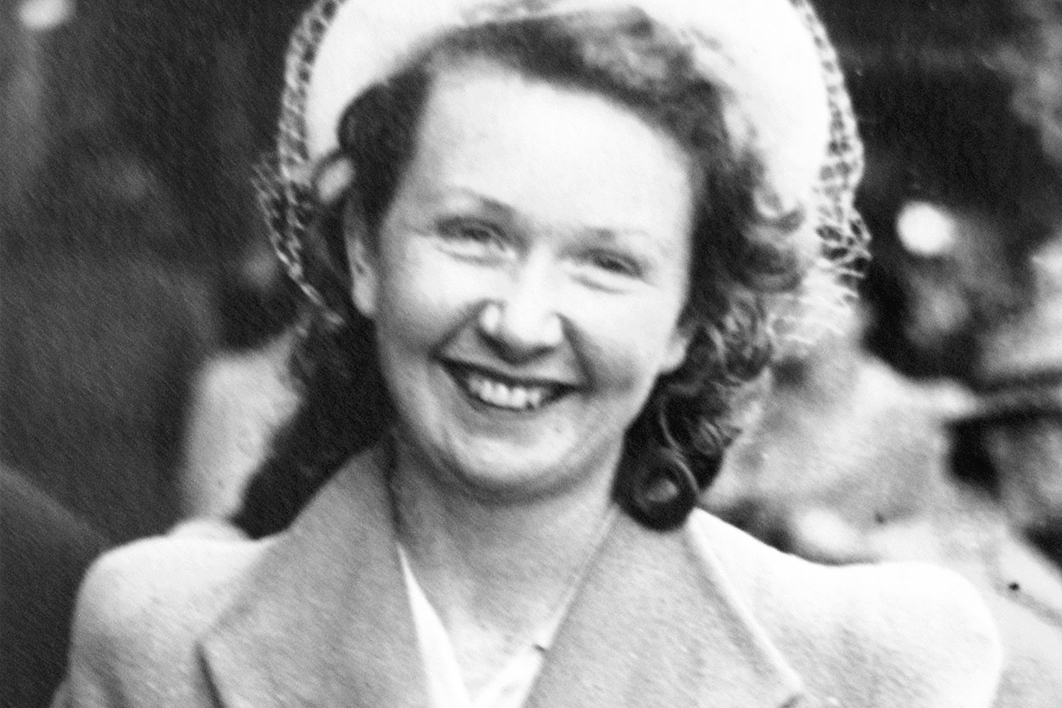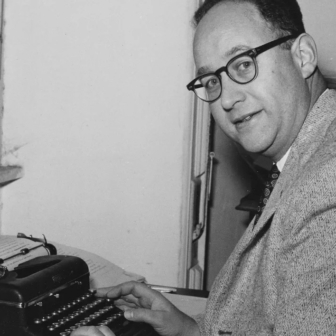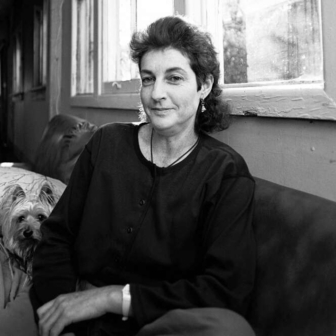When it was time to go into the small sandstone church we checked off our names at the door and picked up copies of the booklet with April on the cover. The black-and-white street photo, with her netted spring hat and shoulder-padded winter coat, summoned up the late 1940s when she was in her mid-twenties and working as a freelance writer and publishers’ typist. As she had done since soon after her birth in 1924, she was living with her mother, the poet Zora Cross, six kilometres from the church we were about to enter. Apart from a few months away here and there, she stayed on the family property until a year before her death in October at the age of ninety-six.
Numbers in the church were limited by the pandemic, and only two of us could sit in each pew. People from different families weren’t supposed to share a pew, but I had been asked if I was happy to sit in the second row next to one granddaughter and behind another, both visibly grieving. I felt like a fraud: losing April didn’t feel as visceral as the loss twenty-five years ago of my own maternal grandmother, who had been living on the other side of the world.
But a few minutes into the eulogy I could see why I’d been given that seat. Having begun by saying he would try to put his grief aside while he celebrated his mother’s life, April’s son Shane listed some of her many achievements as a writer. She had contributed to most of the leading Australian publications and to some overseas, including the Sunday Times in Britain and Life magazine in the United States. She had been the editor of Pol magazine and Craft Australia. She had written ten published books — the first, a murder mystery, as the twenty-year-old April McKee-Wright, the last, The Craftsman, as the seventy-nine-year-old April Hersey. Her health manual and memoir, The Insulted Heart: Recovery from Bypass Surgery, published in 1996, was probably her most successful book.
Shane reminded us that “April was a very stylish Australian woman.” In fact, he said, she “wrote the book” on style. “No, she really did. It was called Australian Style, published in 1970.” He held up a copy of the still-stylish hardcover she had written with the designer Babette Hayes — I’d looked at it that week at the State Library — full of orange-hued, bold-patterned interiors and her clear, engaging prose. Shane told me afterwards he’d learnt the value of a good prop when making a speech, and gave me the copy (one of several in the family) to keep.
The only time he had to pause to compose himself during the eulogy was when he began to talk about April’s defence of her parents’ legacy. “You may think of April’s house in Wright Street as a welcoming family home with a lovely garden,” he said of the house he had grown up in. “I see it differently. For me it was her fortress, where she fought for her parents’ reputations over many decades, first her father’s and then her mother’s.” He felt my biography of her mother had made April feel she had won the war, and that knowing it was being written “gave her the strength to continue to the age of ninety-six years old.”
I could see that April had reconciled herself to many sources of grief — the early loss of her sister, the breakdown of her marriage, the death of her daughter after decades battling brain cancer. She had little to say about these heartbreaks, perhaps because nothing could be done about them. But she’d never let go of the idea that she could salvage her parents’ reputations. And that might have been an impossible place — a fortress — for a biographer to walk into.
I didn’t meet April Hersey until she had already lived longer than most people expect to. It was August 2012 and she was eighty-eight. I’d heard that the daughter of the Australian writers Zora Cross and David McKee Wright was still living at Glenbrook, in the lower Blue Mountains, on the block of land her parents had moved to in 1919. I found her address online and wrote a letter telling her I had become fascinated by her mother’s life and work and wanted to write a biography.
The next day I was browsing in the children’s section of a large bookshop in the centre of Sydney when an unknown number appeared on my phone. It was a fitting place to take a call from the youngest and last surviving child of two writers for whom book-buying was a passion and almost a curse.
April was delighted by my plans. She said she would write but had wanted to call first. In her letter, which arrived the day after that, she wrote that her mother “certainly deserves to have a well-researched and I hope sympathetic history of her life.” The poet whose collection Songs of Love and Life stunned the Australian literary world in 1917 had been mythologised as some kind of femme fatale. “She was a dedicated writer,” April wrote, “who worked all and every day at her Remington typewriter with a pen close handy for the innumerable corrections that she made.”
The brief letter conjured a convincing image of Zora Cross through the eyes of her closest witness, the child whose mother was always writing — all and every day. It placed the poet’s reputation on one side of the scales, weighed down with all the criticism over the years: that her writing hadn’t been worth much, that her obsession with it had been a delusion. On the other side of the scales would be the biography, lifting up the stubborn weight of the life.
A few weeks after the letter arrived I took the train to visit April at Glenbrook. When I pushed through the metal gate, I was greeted by a barking dog. Then April appeared — a small woman with white hair and glasses — shooing the dog away and walking up the path towards me using two ski-poles to help her balance. Her warm welcome cancelled out the dog’s hostility. “Cathy,” she flattered me, at forty, through her clouding cataracts, “you look about nineteen.”
I followed her down an overgrown path to a stone and wood house. Inside were books, small oil paintings, unmatched patterned china on open shelves, a large noticeboard full of family photos, and a long list of names and phone numbers. We ate homemade asparagus quiche while she told me stories about her parents, then we sat in the garden among roses they had planted. Having read so many of the letters Zora wrote from that place, I felt as though I’d stepped into a favourite novel and had to be careful not to spoil it for everyone.
Soon after our first meeting, April and her family organised a party for me in her garden. I was nervous about being celebrated before I’d put more than a few words on the page. It felt like a launch for a book that was only an idea, willing it into existence. One of April’s neighbours — the descendant of a prominent nineteenth-century thinker — suggested I make a speech and, seeing my strong preference not to, made one himself.
The long grass had been cleared and tables set up under the trees. I was trying to imagine how the five-acre block had looked through April’s childhood and young adulthood. The land had long since been subdivided to provide homes for April’s son and daughter. People were pointing in various directions: That’s where the original house was before the termites destroyed it. That’s where Zora’s son Ted had his study. That’s where Zora’s small house was.
Someone recalled how few objects there were in Zora’s house, how sparely furnished it had been, and April put it down to poverty. But others suggested it was always possible to fill rooms, even without much money. The sparseness was more about her lack of interest in the physical world, her obsession with writing. When the family put in a new kitchen for her, she’d wondered what she would do with all the cupboards until it occurred to her that she could use them to store drafts of the novels she was writing.
A granddaughter told me that all she really knew about Zora was that April had laughingly recalled serving tea to visitors at the age of three because her mother had been so absorbed in her writing. It was April’s light-hearted version of the slightly darker tales of Zora’s parenting, told by her stepchildren, that had found their way into print. And just because they weren’t the sort of stories people tell about male writers didn’t mean I could ignore them.
April always stressed how much she’d loved her mother, even if she could at times be “maddening.” Her pride in Zora’s commitment to writing coexisted with her knowledge that there had been a cost to it. When we were drinking tea at her kitchen table on a weekday morning a year or so after the party, she told me Zora was always very encouraging; she was interested in everything the children did, but “she wasn’t the kind of mother who turned up to school sports days.” I had to admit it was my children’s swimming carnival that day. “Oh, you must go,” she said.
Unlike her older brother, Ted, who inherited Zora’s ambition to write something that would endure, April’s grand writing plans often fell away in favour of journalism that would bring in money to support her family. But even if she didn’t think of it as having literary merit, there was still an art to it. At the gathering in the garden after the memorial service, Shane remembered how seriously his mother took her writing work, and how good she was at it. When she had a job on a local newspaper, she would get an idea, do her research and put a story together so quickly she was told to take it easy because she was making the other writers look bad. It might be about the local butcher, he told me, but after reading April’s report you’d be thinking, “I hadn’t realised it was such an amazing butcher’s shop!”
April had seen enough of her mother’s experience as a struggling artist to avoid it herself. In the 1970s she had a job with World Vision, travelling to Laos, Cambodia, Vietnam and Thailand to document extreme poverty. She would write up the stories to be narrated by celebrities in the charity’s marketing campaigns. She told me she would sometimes look at how people were living in those countries and think many of them were doing better than her family had when she was a child. She had a slightly mischievous look on her face when she said this, because she knew it wasn’t fair to compare Zora’s genteel deprivations with the abject need of the developing world. But the thought had still crossed her mind.
When she was in her early twenties, in 1946, the magazine Australian Woman’s Mirror ran a full-page profile of April in its “Readers Who Write” section. With the title “Poet-writer Daughter of Poet-writer Parents,” it told of her precocious writing ability, citing her first poem, written at the age of two-and-a-half: “In the morning milko,/ Sat we, sat we, sat we, late last night.” She would tell me she wrote it because “that’s what the adults were doing” in her first years, “talking until the milkman came.” She received her first rejection slip for a collection of poems, “Songs of Babyhood,” at the age of five, being given the reason that they were “too immature.” And at ten she wrote an unpublished melodramatic novel. Finding success in the children’s pages, she struggled at first to graduate to the regular press. Daily editors considered her stories “too good,” she told the Mirror, and the editors of weeklies turned them down as “too bad.” This philosophical attitude to the vagaries of literary ambition never deserted her.
At twenty-one, when the profile was written, April was trying to break into the theatre. She spent her time studying playwriting, memorising leading roles from Shakespeare’s plays and learning to tap-dance. She had recently appeared in a “semi-professional musical comedy” at the Conservatorium, and had a job as a typist for a publishing company. But alongside all that activity, she was the “poet-writer daughter,” trying to resurrect the faded reputation of her father — a former Bulletin literary editor and poet — who had died when she was four. “Every spare moment,” the article concluded, “she spends sorting out her father’s works for her proposed The Life and Works of David McKee Wright.” The book was never completed, but a biography by Michael Sharkey appeared in 2012.
Later, April wanted to write a memoir of her mother’s life, but again it proved impossible. Like many of us, she could write about anything except the subjects closest to her. And this added to her sense of frustration when she saw Zora’s or David’s legacies abused.
In 1986 she stormed out of a commemorative event for the publisher Angus & Robertson, disgusted by the portrayal of her mother on the stage of the Sydney Opera House. The playwright had mined the publisher’s archive to find the juiciest letters written to its director George Robertson, and the relatively unknown Zora’s epistolary outpourings had put her centrestage. At the play’s comic conclusion, an actress playing Zora declared her passion — a combination of quotes from her letters and from her love poems — in an attempt to seduce Robertson. April told me she wrote to the publisher to say she would never again give permission for Zora’s words to be used in this way.
My biography also depended on April’s permission to quote Zora’s words. And she told me she wished her mother hadn’t written those “silly letters” that undermined her reputation as a serious writer. But it was Zora’s passionate correspondence that had sparked my interest in her. I saw the letters she mailed off to powerful literary men — and others — as part of her life as a writer. And even if there was a level of performance to it, she left behind a more intimate and engaging record of her experience than many other writers.
Where April envisaged a biography that portrayed her mother as a brilliant poet sometimes thwarted by the publishing industry, I was also drawn to the dark comedy of a writer who couldn’t quite move on from being hailed as a genius for her early work. Where April wanted her mother’s poetry to endure — and much of it also resonated with me — I was just as interested in why it was once so popular. I appreciated what Zora was trying to do when she subverted conventions and persisted with her ambitions as much as I appreciated what she wrote. And whether or not I could place on the scales a biography of sufficient weight, I was the writer who had wandered into the garden when April knew she had to let go. “You have to write it as you see it,” she told me.
As I left the wake, I looked over at April’s house in the garden on the slope down to the gully. Obscured by trees was the trickle of water that some locals call Zora’s Creek. The block had been sold and the new owners had plans to reuse the sandstone in the walls to build a larger house closer to the street. But the construction was yet to begin, and in the meantime April’s house stood empty. The garden that hadn’t had her attention since she moved to a nursing home many months earlier looked colourless and still, as though a breeze could blow through it without rustling any leaves. I could see how the daughter had animated the setting of her parents’ lives.
April once told me she had been digging in that garden one day when she found a stone that looked as though it had been shaped into a tool. She wondered if a local Darug woman had used it to dig edible roots from the soil. “And I thought,” she smiled, “people have been living on this land for a long time.” I asked if she’d kept the stone, and she said she had. But neither of us suggested she should go into the house to look for it. Holding eye contact, we kept the story in the air between us. Her gesture to the longer passage of time and the accretion of forgotten lives seemed like a way of easing the responsibility I’d taken on to write her mother’s life. It was as if she were saying, I’d like you to do this, but it might be enough that you want to. •




